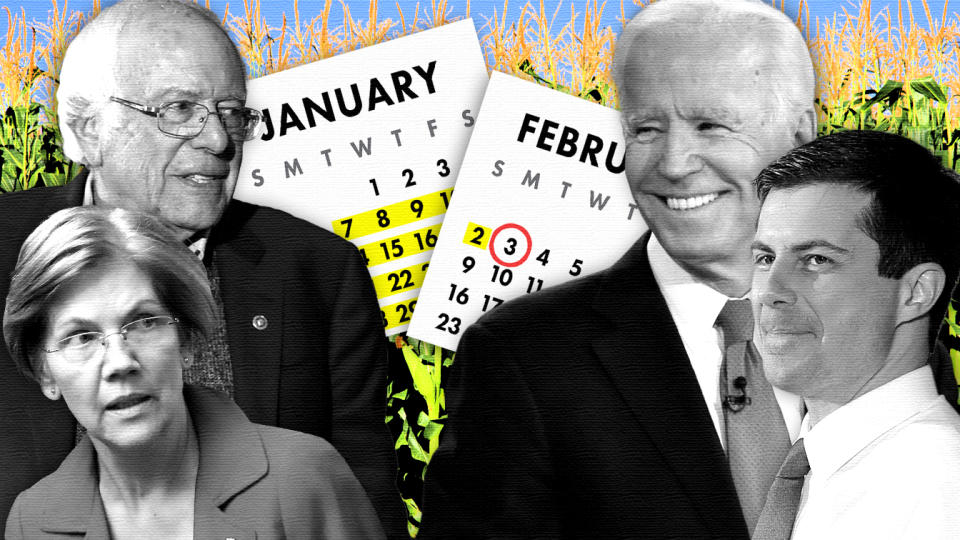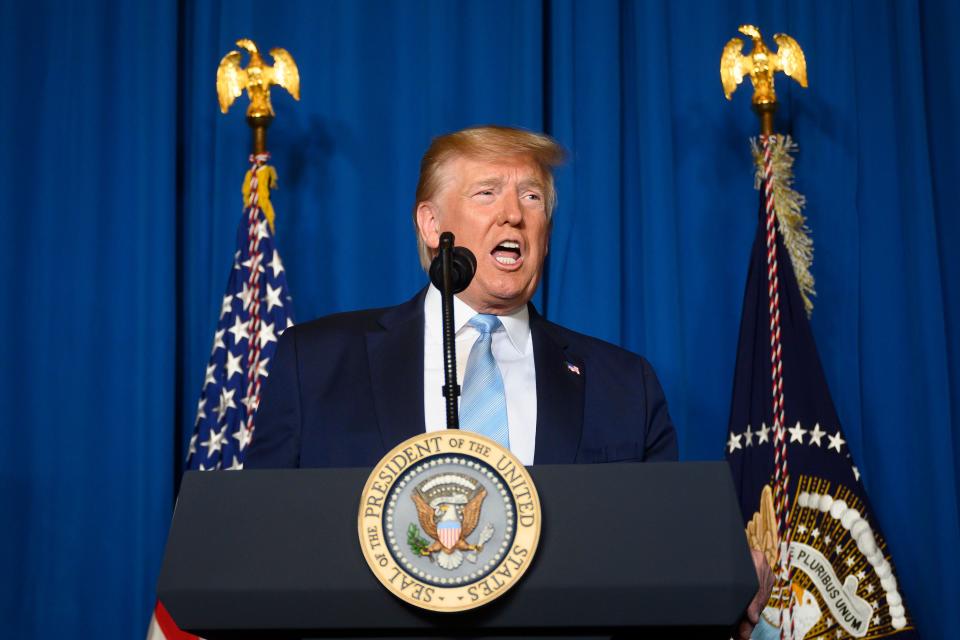Three ways the next 28 days could reset the Democratic primary
Welcome to 2020 Vision, the Yahoo News column covering the presidential race with one key takeaway every weekday and a wrap-up each weekend. Reminder: There are 28 days until the Iowa caucuses and 302 days until the 2020 election.
Remember 2019? That year of presidential campaigning that began on the last day of 2018 when Elizabeth Warren became the first major Democrat to announce? That continued with 27 other Democrats joining her on the trail? That included six rounds of debates, four quarters of fundraising reports and innumerable early-state town halls? That attracted feverish 24/7 coverage from the media?
We know it was a long time ago — six whole days. Your memory might be hazy. But what if none of it mattered?
Sure, candidates have honed their skills. Campaigns have organized. Fourteen Democrats have dropped out. We wouldn’t be where we are today without the events of 2019. But among top staffers for the top candidates, there’s a growing sense that the last 28 days before Iowa may matter more than the last 12 months combined — that the entire contest is about to hit reset.
Consider the current standings. Exactly one year ago, Joe Biden led the field with 27.7 percent support, according to the RealClear Politics national polling average; Bernie Sanders was second with 17.3 percent. Today, Biden leads with 29.3 percent; at 19.9 percent, Sanders is still in second by about 10 points. Nothing that happened in 2019 — not Biden’s gaffes, not Sanders’s heart attack, not the shifting fortunes of other contenders — has changed this simple fact: The Democratic primary’s two most recognizable figures remain its likeliest winners.

The question now is whether we’re due for an upheaval of some sort. Biden’s team would prefer not; their argument has always been that the former vice president’s steady lead reflects a primary electorate that’s far more moderate than the progressive Twitterverse and that he can survive a couple of early setbacks to sweep to victory beginning Feb. 29 in South Carolina on the strength of his support among African-Americans and Democrats who believe he’s the best bet to beat Donald Trump. Same goes for Bernie. He has long aimed for a factional victory, and the more divided the field, the better his chances of stockpiling delegates with his loyal but limited base.
Yet their leading rivals are betting that the next month will be unpredictable, for three reasons. The first is impeachment. It’s not because the issue is divisive; Democrats are united in their belief that Trump should go. It’s that by monopolizing the last few months’ worth of public attention, impeachment has basically frozen the primary in place. There haven’t been any huge shifts in the polling since Thanksgiving, when Warren slipped from second place to third place nationally and Pete Buttigieg surged in Iowa and New Hampshire. Impeachment may be the reason. As soon as it ends — likely this month — the Democratic primary will again become America’s top political story. Renewed attention could mean more volatility in the early states and beyond.

The second reason January could disturb the Democratic equilibrium is Iran. Elections have a recency bias: the closer you get, the more impact an event has on voters. Trump’s decision to kill Iranian military commander Qassem Soleimani and potentially trigger a broader military clash is as big as any event in his presidency. Already we’re seeing the top Democrats try to reframe their candidacies in response: Buttigieg by emphasizing his time as a naval intelligence officer in Afghanistan; Biden by stressing the foreign policy experience he amassed as a senator and vice president; Warren and Sanders by putting their anti-war bona fides front and center. If tensions escalate this month into an outright conflict, Democratic primary voters will head to the polls with a new priority: picking the candidate best-prepared for a foreign policy crisis, and who can most plausibly present himself or herself to the rest of the electorate that way.
The third and final reason January could be a bumpy ride is history — Iowa’s in particular. It’s no secret that Iowans take their first-in-the-nation responsibility seriously. But typically this devotion manifests as an early-warning system of sorts; when a candidate like Buttigieg rises in the polls there, it’s because the most attentive, informed voters like what they see. Often that means voters elsewhere will follow. Less remarked upon, however, is that Iowans also persist in keeping an open mind until the very last minute. According to the new CBS News/YouGov poll — which shows a three-way tie for first place among Biden, Buttigieg and Sanders — only 31 percent of Iowans have “definitely made up their mind” at this point; roughly half are “still considering” Biden, Buttigieg, Sanders and Warren.
It’s always been that way. One month before the 2008 Democratic caucuses, Barack Obama and Hillary Clinton were tied at 27 percent; John Edwards trailed by five. One week before the caucuses, Clinton led with 30 percent; Edwards and Obama trailed by five. Then, on caucus night, Obama won by eight. 2016 was a similar story: One month out, Clinton led Sanders by 13; one week out, Sanders was in first; in the final days, Clinton pulled ahead by four; then they essentially tied on caucus night, a result that was portrayed as a huge win for Sanders.
In other words, don’t be surprised if there are some surprises in store this month. With impeachment winding down, Iran ramping up and Iowans still eyeing the field, the biggest surprise would be if there weren’t.
Read more from Yahoo News:





